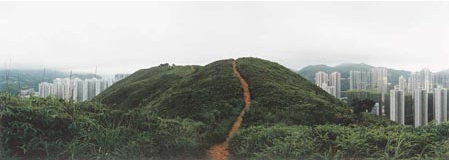Hong Kong 2004

Professors: Prof. Roger Diener, Prof. Marcel Meili,
Emanuel Christ, John Palmesino, Simon Hartmann
Exercise types: “P”
Locations: Group work in Basel and in Hong Kong
Start: Tuesday, 30 April 2004, 10am at ETH Studio Basel, Spitalstrasse 12, 4056 Basel
With the Napoli project of the winter semester, ETH Studio Basel has inaugurated a research project on a series of international cities. These investigations are based on the assumption that contemporary cities do not develop towards a common vanishing point, as occasionally asserted in the current debate on urban evolution: rather, they consolidate, transform, or adapt their specific traits. These processes are not only the result of a consolidation of their local specificity or historical tradition, but also arise from the development of new modalities of transformation and novel forms of differentiation in the wake of the contemporary international linkages and interconnections. Cities are hence, through the processes of globalization, reduced to their own material configuration. This could be understood to imply that these developments do not only invest the exploding “global cities”: on the contrary we are interested in the study of different urban conditions – whether they be peripheral, stagnating, traditional or without history, anonymous or famous – on the basis of the diverse transformation devices that underlie their specific situations.
How are cities developing, changing, and adapting their bodies, their physical configurations, when they are connected to the international energy flows? How are they reconfiguring their specific physiognomy?
In the case of Hong Kong we investigate a city that will disclose these questions in a complex and rich modality.
With the 1997 handover to from British rule to Communist China, this Asian city – with its extraordinary economical and demographic dynamics – has assumed a radically novel orientation. The creation of the HKSAR (Hong Kong Special Administrative Region) raises problematic and almost paradoxical issues regarding the communal propriety of land, social housing systems, and public welfare policies. The transformation of the city, besides its global and local orientations, also implies a parallel and problematic positioning towards the People’s Republic of China.
The perceptive, analytical, and representational instances of this city will be the starting and central point of our research, which will try to outline a “portrait of a contemporary city” from its physical configuration. This will be different from a traditional general urban description and will focus on the specific traits and individual characteristics of Hong Kong. This portrait will render Hong Kong’s contemporary processes of adaptation, change, revision, renovation, and transformation: a physiognomy of a moment within an evolutionary trajectory.
PEOPLE: PROF. MARCEL MEILI, PROF. ROGER DIENER, SIMON HARTMANN, JOHN PALMESINO, EMANUEL CHRIST

